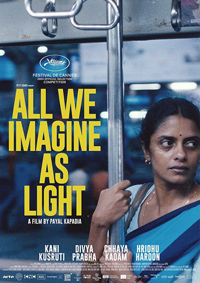The Big City: Kapadia Designs Lovely Portrait of Friendship and Free Will
 Mumbai is a city of illusions, a character remarks in Payal Kapadia’s debut narrative feature, All We Imagine as Light. To survive, one has to buy into the illusion. Opening upon a bus moving through the city, a variety of offscreen characters share their thoughts on the difficulties of living there, a place of impermanence, a city which robs one’s time. We focus on a quiet, withdrawn woman who works as a senior nurse at a specialty hospital, and slowly begin to learn about her life, which includes a new roommate, a much younger nurse who’s just embarked on a clandestine romance. In the teeming metropolis, cultural mores, especially for women, are still rigidly observed, and two women from different generations begin to affect each other on a journey toward embracing a life they’d like to lead rather than what’s been conditioned as a proscribed fate otherwise intended for them. Kapadia establishes a bittersweet but increasingly hopeful tone, building to an unexpectedly gracious crescendo in a compassionate portrait of friendship.
Mumbai is a city of illusions, a character remarks in Payal Kapadia’s debut narrative feature, All We Imagine as Light. To survive, one has to buy into the illusion. Opening upon a bus moving through the city, a variety of offscreen characters share their thoughts on the difficulties of living there, a place of impermanence, a city which robs one’s time. We focus on a quiet, withdrawn woman who works as a senior nurse at a specialty hospital, and slowly begin to learn about her life, which includes a new roommate, a much younger nurse who’s just embarked on a clandestine romance. In the teeming metropolis, cultural mores, especially for women, are still rigidly observed, and two women from different generations begin to affect each other on a journey toward embracing a life they’d like to lead rather than what’s been conditioned as a proscribed fate otherwise intended for them. Kapadia establishes a bittersweet but increasingly hopeful tone, building to an unexpectedly gracious crescendo in a compassionate portrait of friendship.
Although it’s a completely different, inherently more experimental film, Kapadia’s 2021 documentary A Night of Knowing Nothing is, in effect, similarly about a woman witnessing drastic cultural shifts going on around her. All We Imagine as Light is inherently more subtle, but does provide a contemporary portrait of how much Mumbai has changed as far as relationship expectations and the role of women are concerned (as well as suggesting how more progressive transformations are potentially on the horizon, at least for those with a support system). Kapadia’s film (including its poster art) recalls Satyajit Ray’s femme-centric films, particularly 1963’s The Big City, where a middle-class housewife in Calcutta takes a job as a saleswoman, exacerbating expectations. Here, our main heroine is Kani Kusruti’s Nurse Prabha, a woman whose knack for caretaking goes beyond her profession. Quickly, we realize there’s no one looking out for Prabha, abandoned shortly after an arranged marriage to a man who traveled to Germany and hasn’t bothered to call in over a year.

A surprise gift arrives without explanation in the form of a rice cooker, which Prabha embraces intimately, the closest token of care she’s received in some time. Simultaneously, drastic changes for two women in close proximity have unintended effects. Parvaty (Chhaya Kadam), who works on the kitchen staff at the hospital, is being forced out of her apartment of twenty-two years by the developer of a high-rise. Her dead husband never supplied her with the residence papers to prove she lived there, forcing her to return to her village. Prabha’s younger roommate, Anu (Divya Prabha) has fallen in love with Shiaz (Hridhu Haroon), who happens to be Muslim, which means their relationship is likely doomed to failure. The relationship, despite being secret, has tarnished her reputation at work. Prabha is also initially terse towards Anu regarding this courtship, but this is partially due to not ever feeling she could have dared to make such decisions about her own destiny.

Prabha’s situation is an unfortunate catch-22, forcing her into a romantic and emotional exile as the wife of a man who’s all but disappeared. Hers is trajectory usually destined for abject loneliness or eventual tragedy, and recalls Helma Sanders-Brahms’ 1976 film Shirin’s Wedding, a Turkish woman promised to a man who also flees to Germany, but her unfortunate search for him leads to degradation. Prabhu’s reality is less sensational but no less numbing as she solemnly commits herself to care and tend others, including a pregnant cat and a doctor who clearly has a crush on her, gifting sweets and poetry.
The score from Topshe (which is also the nickname of a famous character created by Satyajit Ray), includes a lot wistful piano, baking a melancholic longing into Prabha and Anu’s struggles to reconcile the emotions they’re continually struggling to repress with the reality of their choices. Kapadia reunites with DP Ranabir Das to capture Mumbai not so much as an overwhelming metropolis but, like many cities, a site where Sisyphean rhythm can trap its adopted denizens in emotional isolation.
Prabha is a woman with a significant case of the blues, resigned to a fate someone else assigned her. While Kapadia segues to a different tone in their journey to Parvaty’s village, it feels like an emotional and logical reset. Anu and Shiaz enter a cave of mystical proportions, soaking up the energy of past lovers who have likely explored its secrets. Written messages on its walls feature a variety of languages, and a phrase in Malayalam, which Anu thinks Shiaz wrote, suggests there were others before them navigating the same circumstances. As in Leonard Cohen’s Hey, That’s No Way to Say Goodbye, “Yes, many loved before us,/I know that we are not new.” In the case All We Imagine as Light and its final frames, yes, this is a film which quite sweetly knows how to say goodbye.
Reviewed on May 23rd at the 2024 Cannes Film Festival – Competition. 115 Mins
★★★½/☆☆☆☆☆


